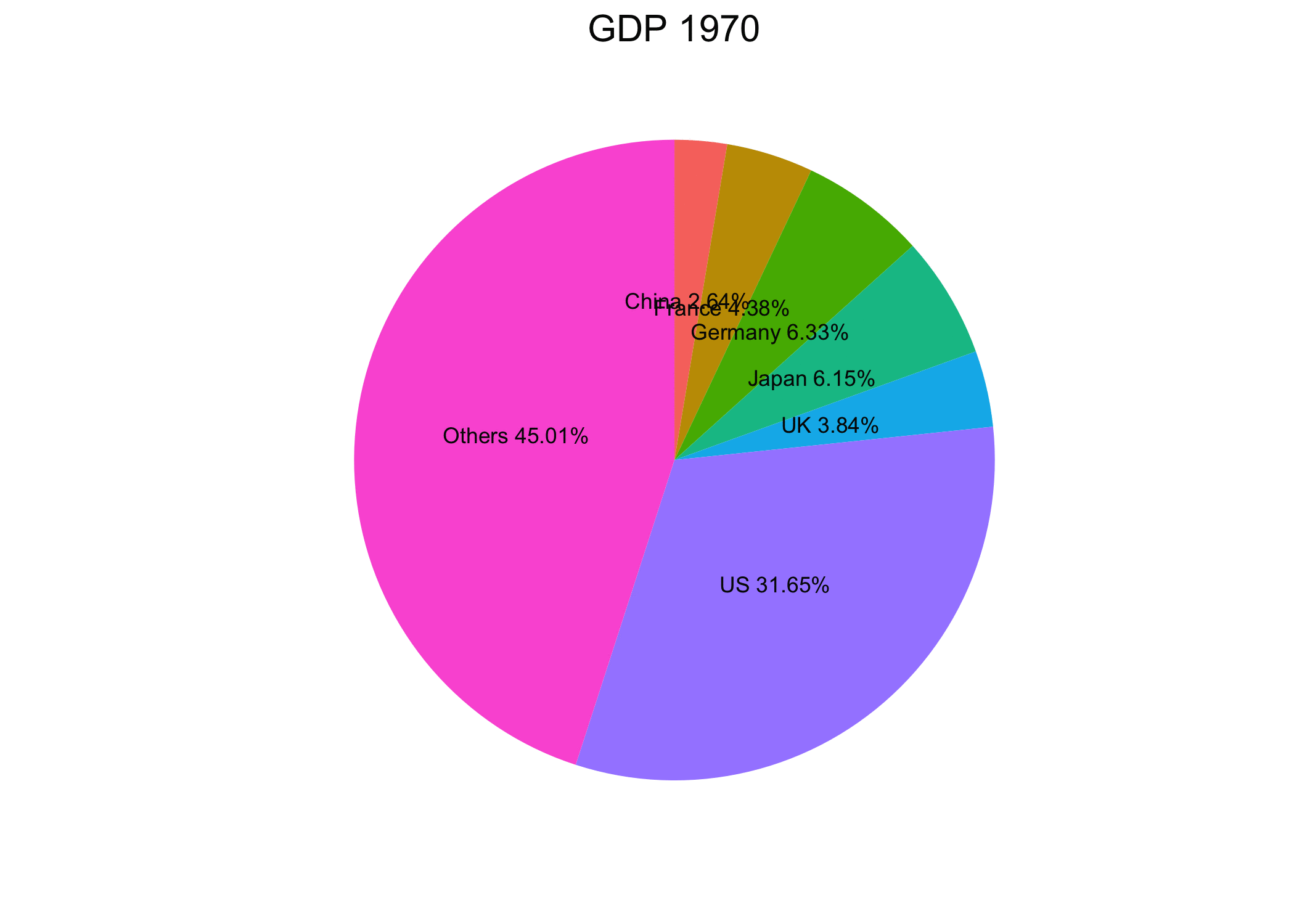1. Simple Pie Chart
GDP data was downloaded from here.
setwd("/Users/alicefelix/Desktop/gdp")
dat <- read.table("GDP1970_2014.txt",header = TRUE)
for(i in 1970:2014){
fn <- paste(i,".png",sep="")
df <- subset(dat,Year==i)
otherGDP <- 2 * df[df$Country=="World",]$GDP - sum(df$GDP)
df2 <- rbind(df,data.frame(Country="Others",Currency="US$", Year=i, GDP=otherGDP))
df3 <- subset(df2, Country != "World")
png(fn)
pie(df3$GDP, labels = df3$Country, main=paste("GDP",i,sep=" "), col=rainbow(length(df3$Country)))
dev.off()
}
system("convert -delay 50 -loop 0 $(ls -v *png) gdp1970_2014.gif")
system("rm *png")
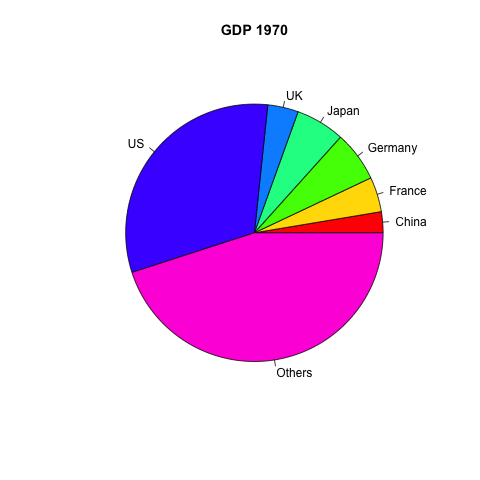
2. Pie Chart with Annotated Percentages
for(i in 1970:2014){
fn <- paste(i,".png",sep="")
df <- subset(dat,Year==i)
otherGDP <- 2 * df[df$Country=="World",]$GDP - sum(df$GDP)
df2 <- rbind(df,data.frame(Country="Others",Currency="US$", Year=i, GDP=otherGDP))
df3 <- subset(df2, Country != "World")
pct <- round(df3$GDP/sum(df3$GDP)*100)
pct <- paste(pct,"%", sep="")
lbls <- paste(df3$Country, pct, sep=" ")
png(fn)
pie(df3$GDP, labels = lbls, main=paste("GDP",i,sep=" "), col=rainbow(length(df3$Country)))
dev.off()
}
system("convert -delay 50 -loop 0 $(ls -v *png) gdp1970_2014v2.gif")
system("rm *png")
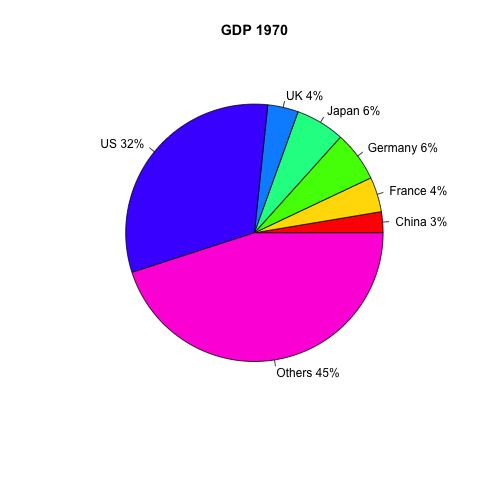
3. 3D Pie Chart
library(plotrix)
for(i in 1970:2014){
fn <- paste(i,".png",sep="")
df <- subset(dat,Year==i)
otherGDP <- 2 * df[df$Country=="World",]$GDP - sum(df$GDP)
df2 <- rbind(df,data.frame(Country="Others",Currency="US$", Year=i, GDP=otherGDP))
df3 <- subset(df2, Country != "World")
pct <- round(df3$GDP/sum(df3$GDP)*100)
pct <- paste(pct,"%", sep="")
lbls <- paste(df3$Country, pct, sep=" ")
png(fn)
pie3D(df3$GDP, labels = lbls, main=paste("GDP",i,sep=" "), col=rainbow(length(df3$Country)), labelcex = 0.8)
dev.off()
}
system("convert -delay 50 -loop 0 $(ls -v *png) gdp1970_2014v3.gif")
system("rm *png")
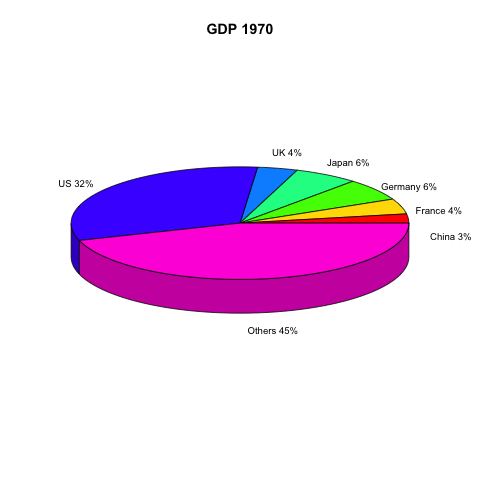
4. Pie Chart with Annotated Percentages
code from 糗世界.
pie1 <- function (x, labels = names(x), edges = 200, radius = 0.8, clockwise = FALSE,
init.angle = if (clockwise) 90 else 0, density = NULL, angle = 45,
col = NULL, border = NULL, lty = NULL, main = NULL, percentage=T,
rawNumber=F, digits=3, cutoff=0.01, legend=F, legendpos="topright",
legendcol=2, ...)
{
if (!is.numeric(x) || any(is.na(x) | x < 0)){
stop("'x' values must be positive.")
}
if (is.null(labels)){
labels <- as.character(seq_along(x))
}else{
labels <- as.graphicsAnnot(labels)
}
rawX <- x
x <- c(0, cumsum(x)/sum(x))
dx <- diff(x)
nx <- length(dx)
plot.new()
pin <- par("pin")
xlim <- ylim <- c(-1, 1)
if (pin[1L] > pin[2L]){
xlim <- (pin[1L]/pin[2L]) * xlim
}else{
ylim <- (pin[2L]/pin[1L]) * ylim
}
dev.hold()
on.exit(dev.flush())
plot.window(xlim, ylim, "", asp = 1)
if (is.null(col)){
col <- if (is.null(density)){
c("white", "lightblue", "mistyrose", "lightcyan",
"lavender", "cornsilk", "pink")
}else{
par("fg")
}
}
if (!is.null(col)){
col <- rep_len(col, nx)
}
if (!is.null(border)){
border <- rep_len(border, nx)
}
if (!is.null(lty))
lty <- rep_len(lty, nx)
angle <- rep(angle, nx)
if (!is.null(density))
density <- rep_len(density, nx)
twopi <- if (clockwise)
-2 * pi
else 2 * pi
t2xy <- function(t) {
t2p <- twopi * t + init.angle * pi/180
list(x = radius * cos(t2p), y = radius * sin(t2p))
}
for (i in 1L:nx) {
n <- max(2, floor(edges * dx[i]))
P <- t2xy(seq.int(x[i], x[i + 1], length.out = n))
polygon(c(P$x, 0), c(P$y, 0), density = density[i], angle = angle[i],
border = border[i], col = col[i], lty = lty[i])
if(!legend){
P <- t2xy(mean(x[i + 0:1]))
lab <- as.character(labels[i])
if (!is.na(lab) && nzchar(lab)) {
lines(c(1, 1.05) * P$x, c(1, 1.05) * P$y)
text(1.1 * P$x, 1.1 * P$y, labels[i], xpd = TRUE,
adj = ifelse(P$x < 0, 1, 0), ...)
}
}
}
if (percentage) {
for (i in 1L:nx){
if(dx[i]>cutoff){
P <- t2xy(mean(x[i + 0:1]))
text(.8 * P$x, .8 * P$y, paste(formatC(dx[i]*100, digits=digits), "%", sep=""), xpd = TRUE,
adj = .5, ...)
}
}
}else{
if(rawNumber){
for (i in 1L:nx){
if(dx[i]>cutoff){
P <- t2xy(mean(x[i + 0:1]))
text(.8 * P$x, .8 * P$y, rawX[i], xpd = TRUE,
adj = .5, ...)
}
}
}
}
if(legend) legend(legendpos, legend=labels, fill=col, border="black", bty="n", ncol = legendcol)
title(main = main, ...)
invisible(NULL)
}
for(i in 1970:2014){
fn <- paste(i,".png",sep="")
df <- subset(dat,Year==i)
otherGDP <- 2 * df[df$Country=="World",]$GDP - sum(df$GDP)
df2 <- rbind(df,data.frame(Country="Others",Currency="US$", Year=i, GDP=otherGDP))
df3 <- subset(df2, Country != "World")
png(fn)
pie1(df3$GDP, labels = df3$Country, main=paste("GDP",i,sep=" "), col=rainbow(length(df3$Country)))
dev.off()
}
system("convert -delay 50 -loop 0 $(ls -v *png) gdp1970_2014v4.gif")
system("rm *png")
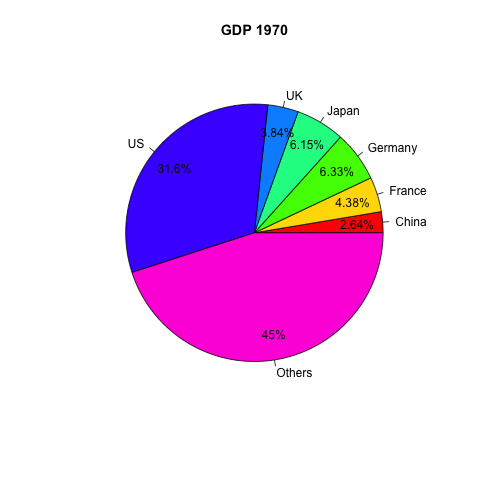
5. pie chart with ggplot2
library(ggplot2)
library(dplyr)
for(i in 1970:2014){
fn <- paste(i,".png",sep="")
df <- subset(dat,Year==i)
otherGDP <- 2 * df[df$Country=="World",]$GDP - sum(df$GDP)
df2 <- rbind(df,data.frame(Country="Others",Currency="US$", Year=i, GDP=otherGDP))
df3 <- subset(df2, Country != "World")
#df3 = df3[order(df3$GDP, decreasing = TRUE),] #用 order() 让数据框的数据按 GDP 列数据从大到小排序
df3 <- df3 %>% group_by(Year) %>% mutate(pos = cumsum(GDP)- GDP/2)
pct <- round(df3$GDP/sum(df3$GDP)*100, 2)
pct <- paste(pct,"%", sep="")
lbls <- paste(df3$Country, pct, sep=" ")
p <- ggplot(df3, aes(x = "", y = GDP, fill = Country)) +
geom_bar(stat = "identity", width = 1) +
coord_polar(theta = "y") +
labs(x = "", y = "", title = paste("GDP", i)) + ## 将标签设为空
geom_text(aes(x="", y=pos, label = lbls), size=3) +
theme_bw() +
theme(panel.border = element_blank(), panel.grid.major = element_blank(),
panel.grid.minor = element_blank(), axis.line = element_blank(),
axis.ticks = element_blank(), axis.text.x = element_blank(),
legend.position ="none") # 去掉背景坐标图标
ggsave(fn,p)
}
system("convert -delay 50 -loop 0 $(ls -v *png) gdp1970_2014v5.gif")
system("rm *png")
